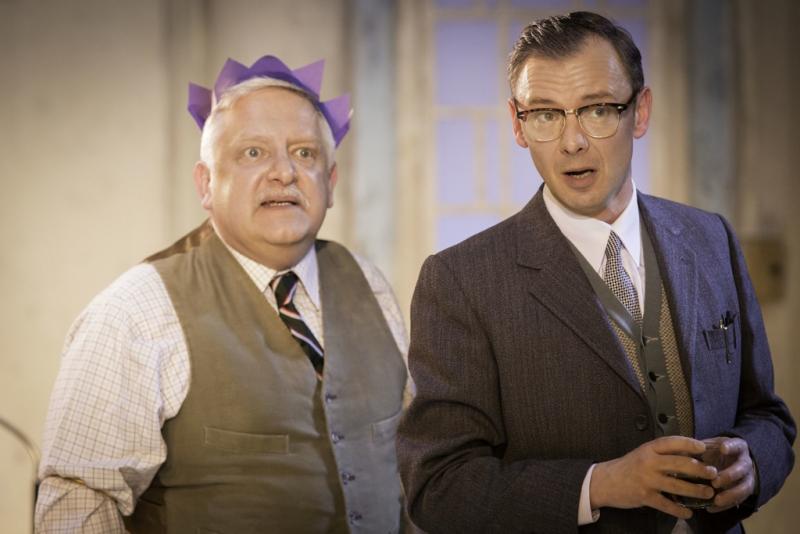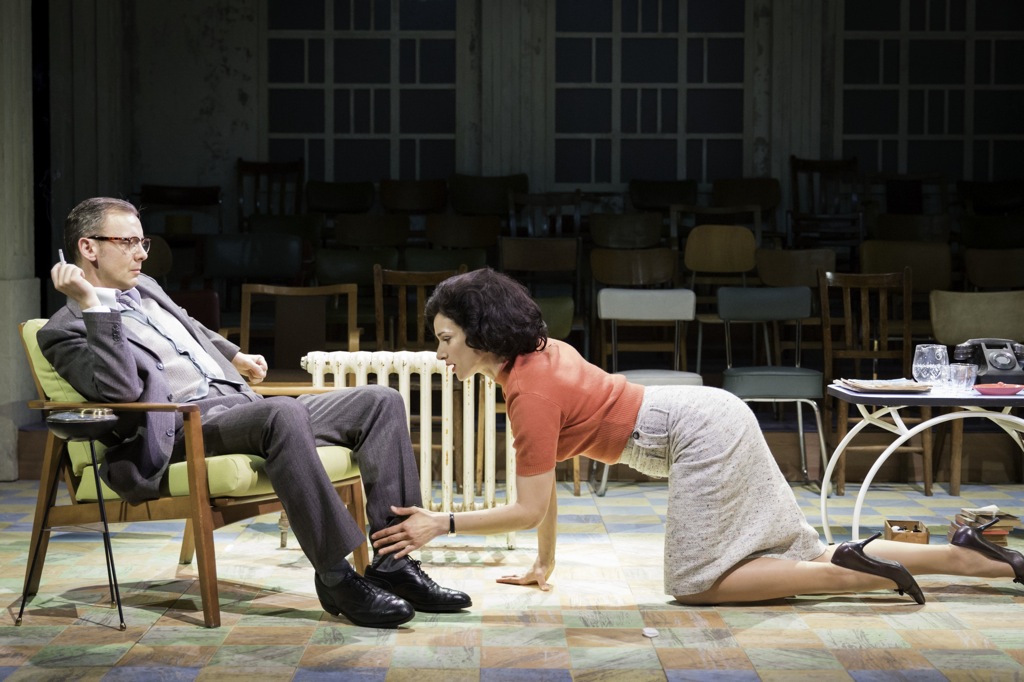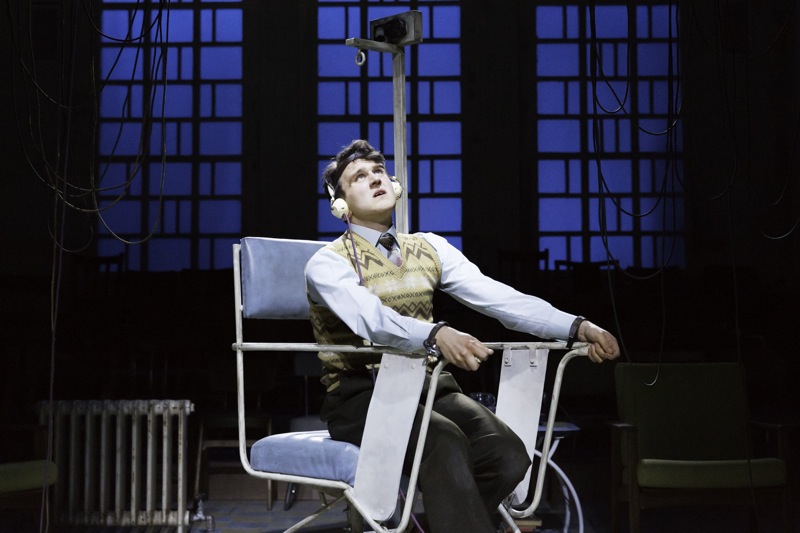The Hothouse, Trafalgar Studios | reviews, news & interviews
The Hothouse, Trafalgar Studios
The Hothouse, Trafalgar Studios
The lunatics are running the asylum in an uproarious production of Pinter's play, starring Simon Russell Beale and John Simm

Throughout Harold Pinter’s The Hothouse, the characters of an ill-defined institution split hairs over the service it provides. Is it a rest home, a nursing home, a sanatorium? They may be kidding themselves, but not us; not when their chief asserts that “the key word is order”, or when these patients “recommended by the ministry” are known not by their names, but numbers, and not when we glimpse the diabolical misdeeds behind the door of Room 1A.
Pinter wrote the play in 1958, immediately shelved it, only dusting it off for use in 1980; the intervening years turned prescience into stone-cold authenticity, made more distinct with each decade that follows. Maybe the reason it feels like such an atypical political play is exactly because it was written before Brezhnev ordered the detention and psychiatric abuse of dissidents, or the Americans sanctioned torture in Guantanamo. Kafka is wandering these halls, as is Beckett, while jokes fly with the gay abandon of vaudeville. Rather than the comfort of moral superiority, we feel the guilty pleasure of laughing our socks off. An attack on totalitarianism just happens to have opened as the funniest play in London.
The halls echo not with ho-ho-ho but the sounds of eerie moans and cries
In his large, drab office the beleaguered Roote (Simon Russell Beale) is being briefed by his younger, cooler, more calculating subordinate, Gibbs (John Simm), as to some disturbing occurrences. It seems that 6457 has died, of heart failure, while 6459 has just given birth, to a boy. “How did she manage it?” asks Roote. “She had an accomplice”.
A staff member is suspected of raping 6459 and Gibbs is charged with identifying the culprit; it’s likely that the same person killed 6457. It’s Christmas. The halls echo not with ho-ho-ho but the sounds of eerie moans and cries. We never see the patients. But as we meet the staff, we can assume that the lunatics are running the asylum.
 There’s Lamb (Harry Melling), whose sole job is to check the locks on the patients’ doors each night, a chattering loon who threatens to explode with stifled ambition; the well-named Lush (John Heffernan), whose encounter with the dead man’s mother may have sparked a conscience; the siren Miss Cutts (Indira Varma, pictured above with John Simm), her every appearance amply preceded by her conical bra, lover of both Roote and Gibbs and desperate for some hanky panky in 1A’s torture chamber. As for Gibbs, he may continually mutter “something’s going on,” but he’s hardly an innocent seeking the truth.
There’s Lamb (Harry Melling), whose sole job is to check the locks on the patients’ doors each night, a chattering loon who threatens to explode with stifled ambition; the well-named Lush (John Heffernan), whose encounter with the dead man’s mother may have sparked a conscience; the siren Miss Cutts (Indira Varma, pictured above with John Simm), her every appearance amply preceded by her conical bra, lover of both Roote and Gibbs and desperate for some hanky panky in 1A’s torture chamber. As for Gibbs, he may continually mutter “something’s going on,” but he’s hardly an innocent seeking the truth.
They all revolve around Roote, once a colonel, whose portly, moustachioed pomposity brings to mind Captain Mainwaring. “There’s not much I don’t know about poultry," he declares, shortly before telling us, “Women, I’ve known them all.” But while the impression may be of a vainglorious buffoon who has lost the plot – and whose staff are lining up to mock, even replace him – there’s more to this man whose claim not to have known about 6457’s death doesn’t tally with his signing of the death certificate. Just as he did with Stalin in Collaborators, Russell Beale reveals Roote’s power and malice by stealth, amid laughter.
Roote’s attack on Lush with an over-generous portion of Christmas cake, their gloriously escalating drunkenness, and the three-way stand-off with blades of very different proportions between these two and Gibbs are marvels of physical comedy; as is Simm’s body language, the most controlled of the characters occasionally letting himself go with an elastic stretch of such wincing obsequiousness that John Cleese couldn’t better it. The farce is interspersed with an array of flamboyant satirical monologues, all brilliantly delivered, usually constructed to demonstrate the power of words to shape and conceal malicious intent. Language and deed come together in the closing scene of act one, involving a luckless Lamb (Melling, pictured above), with a scene so chilling that it leaves us in no doubt of the real menace beneath the bureaucratic absurdities, and lingers in one’s mind throughout the subsequent high jinks.
The farce is interspersed with an array of flamboyant satirical monologues, all brilliantly delivered, usually constructed to demonstrate the power of words to shape and conceal malicious intent. Language and deed come together in the closing scene of act one, involving a luckless Lamb (Melling, pictured above), with a scene so chilling that it leaves us in no doubt of the real menace beneath the bureaucratic absurdities, and lingers in one’s mind throughout the subsequent high jinks.
So director Jamie Lloyd has followed his Macbeth with another sure-fire hit, which will advance his rejuvenation of the Trafalgar Studios. Not all the staging works: the seating of a tiny section of the audience behind the stage serves no discernible purpose (and looked bloody uncomfortable); the penultimate scene, which suggests the fate of the characters, feels perfunctory given the precision of most that has gone before. But in conveying Pinter’s lightning movement between hilarity and menace, and the prevailing, disquieting ambiguity of events in his sinister state, this is a triumph.
rating
Explore topics
Share this article
Add comment
The future of Arts Journalism
You can stop theartsdesk.com closing!
We urgently need financing to survive. Our fundraising drive has thus far raised £49,000 but we need to reach £100,000 or we will be forced to close. Please contribute here: https://gofund.me/c3f6033d
And if you can forward this information to anyone who might assist, we’d be grateful.

Subscribe to theartsdesk.com
Thank you for continuing to read our work on theartsdesk.com. For unlimited access to every article in its entirety, including our archive of more than 15,000 pieces, we're asking for £5 per month or £40 per year. We feel it's a very good deal, and hope you do too.
To take a subscription now simply click here.
And if you're looking for that extra gift for a friend or family member, why not treat them to a theartsdesk.com gift subscription?
more Theatre
 Hedda, Orange Tree Theatre review - a monument reimagined, perhaps even improved
Scandinavian masterpiece transplanted into a London reeling from the ravages of war and the inexorable march of post-colonialism
Hedda, Orange Tree Theatre review - a monument reimagined, perhaps even improved
Scandinavian masterpiece transplanted into a London reeling from the ravages of war and the inexorable march of post-colonialism
 The Assembled Parties, Hampstead review - a rarity, a well-made play delivered straight
Witty but poignant tribute to the strength of family ties as all around disintegrates
The Assembled Parties, Hampstead review - a rarity, a well-made play delivered straight
Witty but poignant tribute to the strength of family ties as all around disintegrates
 Mary Page Marlowe, Old Vic review - a starry portrait of a splintered life
Tracy Letts's Off Broadway play makes a shimmeringly powerful London debut
Mary Page Marlowe, Old Vic review - a starry portrait of a splintered life
Tracy Letts's Off Broadway play makes a shimmeringly powerful London debut
 Little Brother, Soho Theatre review - light, bright but emotionally true
This Verity Bargate Award-winning dramedy is entertaining as well as thought provoking
Little Brother, Soho Theatre review - light, bright but emotionally true
This Verity Bargate Award-winning dramedy is entertaining as well as thought provoking
 The Unbelievers, Royal Court Theatre - grimly compelling, powerfully performed
Nick Payne's new play is amongst his best
The Unbelievers, Royal Court Theatre - grimly compelling, powerfully performed
Nick Payne's new play is amongst his best
 The Maids, Donmar Warehouse review - vibrant cast lost in a spectacular-looking fever dream
Kip Williams revises Genet, with little gained in the update except eye-popping visuals
The Maids, Donmar Warehouse review - vibrant cast lost in a spectacular-looking fever dream
Kip Williams revises Genet, with little gained in the update except eye-popping visuals
 Ragdoll, Jermyn Street Theatre review - compelling and emotionally truthful
Katherine Moar returns with a Patty Hearst-inspired follow up to her debut hit 'Farm Hall'
Ragdoll, Jermyn Street Theatre review - compelling and emotionally truthful
Katherine Moar returns with a Patty Hearst-inspired follow up to her debut hit 'Farm Hall'
 Troilus and Cressida, Globe Theatre review - a 'problem play' with added problems
Raucous and carnivalesque, but also ugly and incomprehensible
Troilus and Cressida, Globe Theatre review - a 'problem play' with added problems
Raucous and carnivalesque, but also ugly and incomprehensible
 Clarkston, Trafalgar Theatre review - two lads on a road to nowhere
Netflix star, Joe Locke, is the selling point of a production that needs one
Clarkston, Trafalgar Theatre review - two lads on a road to nowhere
Netflix star, Joe Locke, is the selling point of a production that needs one
 Ghost Stories, Peacock Theatre review - spirited staging but short on scares
Impressive spectacle saves an ageing show in an unsuitable venue
Ghost Stories, Peacock Theatre review - spirited staging but short on scares
Impressive spectacle saves an ageing show in an unsuitable venue
 Hamlet, National Theatre review - turning tragedy to comedy is no joke
Hiran Abeyeskera’s childlike prince falls flat in a mixed production
Hamlet, National Theatre review - turning tragedy to comedy is no joke
Hiran Abeyeskera’s childlike prince falls flat in a mixed production
 Rohtko, Barbican review - postmodern meditation on fake and authentic art is less than the sum of its parts
Łukasz Twarkowski's production dazzles without illuminating
Rohtko, Barbican review - postmodern meditation on fake and authentic art is less than the sum of its parts
Łukasz Twarkowski's production dazzles without illuminating

Comments
I shall never forget one of